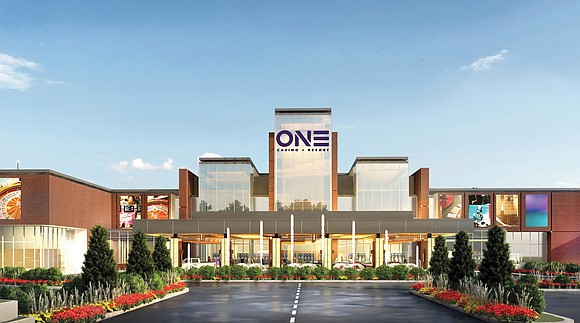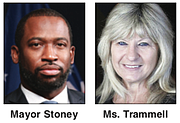Double down
City Council's yes vote is still a gamble for South Side casino
Jeremy M. Lazarus | 1/27/2022, 6 p.m.
If at first you don’t succeed, ...
That’s the mantra of City Council when it comes to a proposed $565 million casino resort in South Side.
Just three months after voters narrowly rejected the planned gambling mecca that was projected to provide a gusher of jobs and new tax revenue, the council wants a do-over.
By an overwhelming 8-1 vote Monday, City Council members ignored dissent and approved giving Richmond voters a second chance to authorize the privately owned gambling development that could yield an average of $50 million a year in new money for city coffers.
The supermajority included representatives of the majority-white 1st, 3rd, 4th and 5th districts whose voters had rejected the casino as well as representatives of the majority-Black 6th, 7th, 8th and 9th districts whose voters supported the proposal. Second District Councilwoman Katherine Jordan, whose majority-white district also overwhelmingly rejected the casino, was the lone dissenter.
The vote came on the same night that the council also approved Mayor Levar M. Stoney’s proposal to hand ownership and decision-making over 13 publicly owned Confederate statues and their pedestals to the Richmond-based Black History Museum and Cultural Center of Virginia.
On the casino front, the council action enables the Stoney administration to petition the Richmond Circuit Court to place on the November ballot the same measure that failed by about 1,500 votes.
Still, the council vote may be an exercise in futility if the General Assembly intervenes.
Richmond, despite already having a thriving gambling scene that includes cash poker games as well as a variety of slot machine options, was the only one of five cities where voters turned down a casino. Voters in Bristol, Danville, Portsmouth and Norfolk approved casino developments in 2020 votes.
Seeking to head off a repeat vote in Richmond, legislation that would first give Petersburg the opportunity to have a casino and to bar Richmond from holding a second referendum for five years is now working its way through House and Senate committees.
Richmond state Sen. Joseph D. Morrissey, a Democrat who also represents Petersburg, is spearheading one bill while Re-publican Delegate Kim Taylor, who also represents the Cockade City, is pushing the House version.
The council’s casino measures, which 8th District Council- woman Reva M. Trammell introduced, essentially would again allow the city’s selected casino developer, Maryland-based Black media company Urban One, to move forward.
As planned, the project, to be built on 100 acres adjacent to the Bells Road interchange of Interstate 95, was to include a major casino, a 50-acre park, a 250-room hotel, a major sound stage for TV, film and video production, and several restaurants.
The project, which did not require any contribution or subsidy from the city, was projected to generate 3,000 construction jobs, 1,500 full- and part-time jobs onsite, $1.5 million in annual contributions to charity, and more than $500 million in new tax revenue to the city over the first 10 years.
In a bid to make the casino more palatable, the Stoney administration has introduced separate legislation on how the projected stream of casino revenue would be used.
The new proposal, which 3rd District Councilwoman Ann-Frances Lambert made a condition for supporting a second vote, calls for using a fraction of the money to cut the real estate property rate by at least 2 cents and using the rest to provide a new stream of revenue to pay for new school buildings and address other city building and infrastructure needs.
Overall, the council members agreed the deal that would cost the city nothing was too good to pass up.
During the public comment period ahead of the vote, Allan-Charles Chipman, who ran unsuccessfully for the 6th District seat in 2020, was among 10 people critical of the second referendum, decrying it as an act of “voter suppression.”
“The passage of this legislation would defy the expressed will of the people in Richmond,” said Mr. Chipman, who campaigned against the casino as a rip-off of low-income residents.
Third District resident Debbie Rowe said that council gave the people an opportunity to decide the casino’s fate. “Well, we did,” she said, “and a majority of city voters said no.”
David Dominique of the 7th District called casino revenue “a regressive tax” on lower-income residents. He cited national studies showing that casinos make 80 percent of their money from working people’s losses on slot machines and create significant increases in gambling addiction that imposes major costs on individuals, families and the larger community.
Ten other people voiced support for a new vote, including Mark Hourigan, who runs a Richmond-based construction firm. “There is simply no other economic development deal that provides this kind of upside with virtually no cost or downside risk to the city.”
Despite the potential downside, council members argued that too many people voted against the proposed casino with the mistaken belief that tax dollars would be used to support the development.
“This is one of the rare occasions where there is an economic development project before this city with zero city investment and 100 percent city return and city benefit,” said Council President Cynthia I. Newbille, 7th District.
Council supporters also rejected the argument a second vote would violate the precepts of majority rule.
“Is this undemocratic? No,” said Councilman Michael J. Jones, 9th District. “We are following the democratic process. We are well within the confines of the law, and I believe we should move in accordance to that. It would be undemocratic only if we put shovels in the ground after the vote.”
Councilman Andreas D. Addison, 1st District, agreed: “Referendums happen on cycle and repeat. They are recalled again all across the country. It is not undemocratic. It is actually part of the process of making things better.”
On the statues, the council voted unanimously to hand over various statues to the Black History Museum, which will be fully responsible for them, including $5 million in insurance.
The list of items the museum will control include the statues and the pedestals of Robert E. Lee, J.E.B. Stuart, Stonewall Jackson, Jefferson Davis and Matthew Fontaine Maury, as well as the statues and pedestals for Confederate soldiers and sailors, Joseph Bryan, Fitzhugh Lee, Williams C. Wickham and the Richmond Howitzers. The list also includes two copies of a Confederate cannon.
Under the plan, the Black History Museum would partner with The Valentine and other groups to secure public input and determine the fate of items long considered symbols of white supremacy.
As announced, the city was to retain physical possession until a final plan was in place for the items’ disposal.








